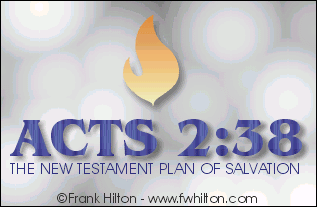CHAPTER FOUR
“Baptism AD”
Although water baptism plays a prominent role in the Modalist’s plan of salvation, it plays absolutely no part in the Christian plan of salvation. Instead, water baptism is performed as a work of righteousness, while salvation is “Not by works of righteousness which we have done.” (Matthew 3:15; Titus 3:5)
BAPTISM AND JOHN 3:5
Modalists are quick to cite this passage as proof positive that one must be water baptized for salvation. This passage reads:
“Jesus answered, "Most assuredly, I say to you, unless one is
born of water and the Spirit, he cannot enter the kingdom of God.”
Although this passage is clearly talking about the born again experience, Modalists see the word water and immediately read into it “water baptism.” Quite frankly, the word water used in this passage refers, contextually and quite simply, to the waters present at the natural birth. This is easily proven by reading the passage in context. Consider:
- Verses 1 thru 4 – “There was a man of the Pharisees named Nicodemus, a ruler of the Jews. This man came to Jesus by night and said to Him, "Rabbi, we know that You are a teacher come from God; for no one can do these signs that You do unless God is with him. Jesus answered and said to him, "Most assuredly, I say to you, unless one is born again, he cannot see the kingdom of God.'' Nicodemus said to Him, "How can a man be born when he is old? Can he enter a second time into his mother's womb and be born?”(emphasis mine)
This passage opens with a clandestine encounter between Nicodemus and Christ. Nicodemus had come to believe that Christ was truly representing the God he believed was represented by himself and the other Pharisees. Christ then informs Nicodemus that he would never see the Kingdom of Heaven unless he was born again. This “born again” concept was a novel idea to those living during Nicodemus era. While this term is common in our day and age, no one had ever used this type of language or symbolism in relation to gaining access to God’s kingdom leading up to and including the time of Nicodemus’ encounter with Christ. Because of his confusion in understanding this new idea, Nicodemus responded by relating Christ’s words to the only point of reference he had for a birth experience; that of the natural birth.
- Verses 5 thru 7 – “Jesus answered, 'Most assuredly, I say to you, unless one is born of water and the Spirit, he cannot enter the kingdom of God. That which is born of the flesh is flesh, and that which is born of the Spirit is spirit. Do not marvel that I said to you, You must be born again.'”(emphasis mine)
In response to Nicodemus’s query, (“Jesus answered”), Jesus used, and expanded upon, his confused point of reference to make his point concerning the requirements of this new birth. This can be seen in that:
1. He affirmed Nicodemus’ point of reference, the 1st (natural) birth –
- “…unless one is born of water and the Spirit…”
- “That which is born of the flesh is flesh, and that which is born of the Spirit is spirit”
2. He clarifies the difference between this point of reference and the 2nd (spiritual) birth –
- “…unless one is born of water and the Spirit…”
- “That which is born of the flesh is flesh, and that which is born of the Spirit is spirit”
After this clarification is made between what Nicodemus supposed, and what Christ actually proposed, Christ restated his original declaration; “You must be born again.”
The reason Modalists misinterpret this passage is because they approach it seeking to find support for a preconception. Baptism isn’t even remotely hinted to in here. In fact, I challenge anyone, anywhere to use this passage alone in context to make that point. In reality, one has to approach this passage already holding a preconception to baptismal regeneration theology, a disregard for the “Literal Principle”1 of Hermeneutics, and a willingness to overlay God’s word with this preconception and disregard to find baptism here. In that all of fallen mankind has already experienced natural life through the 1st (flesh) birth, all seeking to experience spiritual life must experience a 2nd (Spirit) birth. “You must be born again.”



